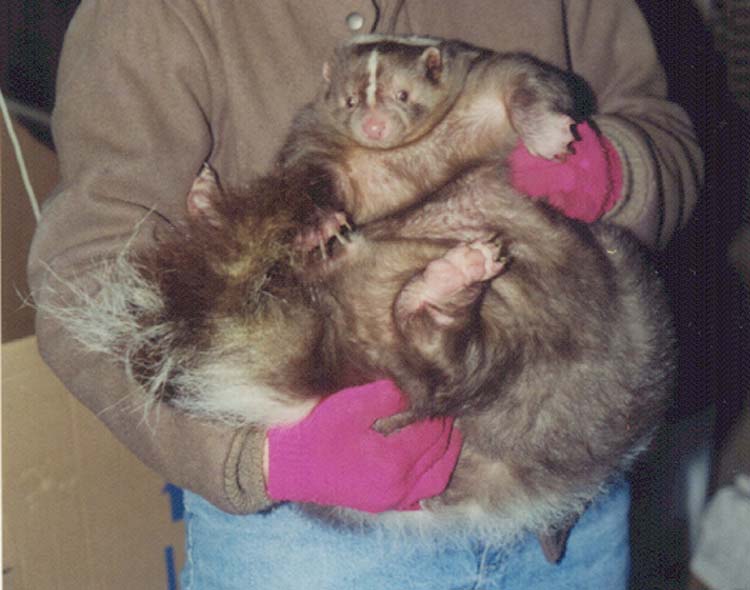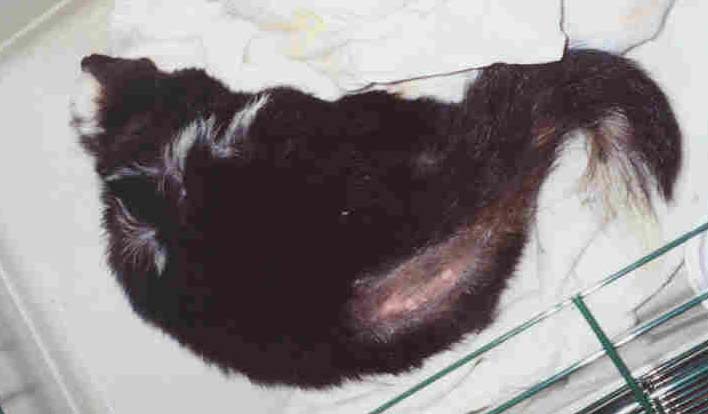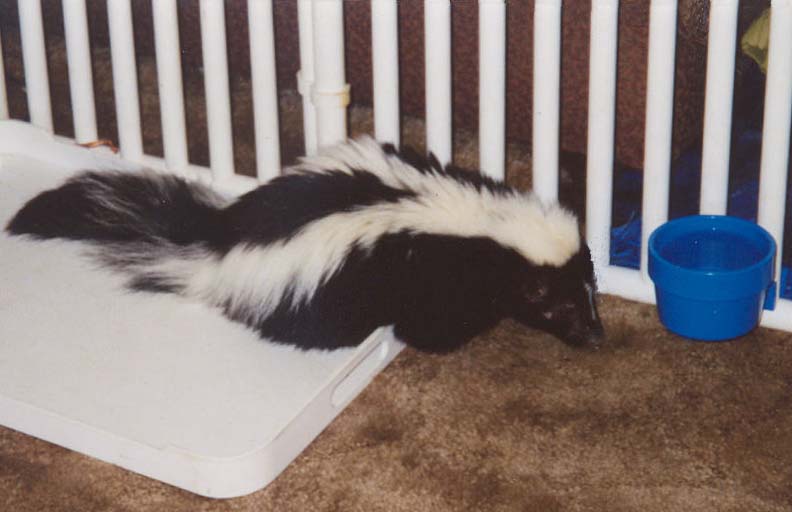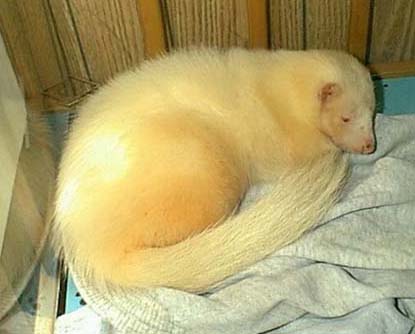
 |
Previous | SkunkHaven.Net Index | Next |
Look at our Menu of Foods page.
Skunks are omnivores, they will eat most anything that tastes, smells, or even looks like food! Your task as a skunk owner is to provide a healthy diet that prevents disease and provides for a long life.
 |
 |
| Extremely Overweight - 40 lb | Improper Diet - Hair Loss, Overweight |
 |
Underweight, Lacking Calcium - Notice this skunk cannot stand on his legs and drags himself along. |
| Malnutrition |
Low fat foods and foods with low crude protein (15 to 25%) are better than high fat and high protein foods. Be careful with processed pet foods, some are very poor quality, contain unnecessary sugars, or have a poor balance of nutrition. High fat or high protein diets make a skunk fat and lazy which leads to poor health.
DO NOT FEED CAT FOOD. Cat food has too much fat and too high protien content for skunks.
No formal studies have been done with skunks to identify the correct doses of calcium, taurine, or any other supplements. The amounts we suggest are based on our experience with skunks at our shelter, with veterinary recommendations.
It is recommend to feed 30% to 40% vegetables and 60 to 70% combination of meats and dairy products. See our sample daily diet plan.
Note: If you feed just vegetables your skunk will lose bone mass.
We recommend using fresh or frozen vegetables; frozen foods should be thawed before serving. Pick a variety of vegetables, even ones you may not like, skunks get bored seeing (smelling) the same things in their bowl. Anything from the fresh or frozen vegetable section of the grocery can be tried (with a few exceptions, like asparagus). Try to use foods that provide sufficient nutrients directly without relying on additional supplements.
A skunk's digestive system is sensitive to processed foods and will not properly digest some prepared foods. Canned foods and dried fruits typically contain excessive salt or other preservatives that can be harmful to a skunk.
 |
Some skunks may be yellow due to bad diet, stress, unclean living conditions, and/or parasite infestation. |
Skunks need extra taurine for muscle formation , vitamins, and calcium and other minerals for bone growth. We use taurine (1000mg) capsules, powder, or liquid, these do not require the extra work of grinding tablets. We recommend approximately 200mg of taurine be added to the diet per day.
Have fresh water available for your skunk at all times, although skunks do NOT drink much water. Typically they should get most of their water requirement from vegetables and cooked grains in their normal diet. If your skunk starts drinking a lot of water see a vet.
One method to determine the correct amount of food is if the skunk is up searching for food within an hour of normal feeding time and is eating enough to stop searching for food about 20 to 30 minutes after finishing the food given. If your skunk is searching for food excessively or "between meals" there is probably something missing from the diet, or not enough food is being given at each meal. If your skunk can sleep through mealtimes consider cutting the portions in half, and force the skunk to get up and exercise more.
Try to gauge the amount of food on how much the skunk can eat in three to five minutes. Pet skunks are likely to get better quality foods and have to exercise less to get it compared to their wild cousins. Skunks should not be given so much food that they will not finish all in one "sitting".
Skunks can tolerate a large variation in their weight throughout the year, however a balanced weight improves the health and well-being of your skunk. Most adult skunks should weigh from 6 to 12 lb (2.5 to 5.5 kg) and may vary 1 to 2 lb (0.5 to 1 kg) each way from their optimum weight as the seasons change; skunks gain in late summer and autumn then lose over the winter months.
If your skunk is overweight get a smaller bowl (small rodent bowl), this helps you get used to not giving them so much.
Wintertime is best for fasting a skunk out of an overweight problem. Wild skunks usually lose weight during the winter and miss quite a few meals without harm. You can skip one meal out of five or not feed them one day a week. Make sure there is water available and keep them in a cold(er) room to help keep them calm. Continue fasting the skunk regularly until it is up searching for food before every mealtime.
You should NEVER let your skunk go without eating. If food intake is to be controlled for weight or veterinary treatment be sure to properly balance feeding requirements and treatment to maintain proper health for your skunk.
Note: If your skunk stopped eating then give him ANYTHING he will eat to get him over what is wrong.
The BEST way to keep your skunk healthy is to monitor it's weight regularly. Kits less than four months old should gain weight very rapidly, weigh them once each week, you should notice regular weight gain each week. Youngsters and young adults should be weighed once each month, watch for excessive weight loss or gain. Adults should be monitored every six to eight weeks, they should not change much over the course of the year. Skunks over six years should be monitored each month (or more often if they have other health problems).
If there are any signs of seizures consider increasing the number of meals (not the total amount of food) given each day. Many skunks with seizure problems are hypoglycemic (having low blood sugar) and need to eat more often to maintain a proper balance in blood chemistry. (Your vet should test blood sugar levels after fasting to determine if low blood sugar is an issue.)
Vitamin and mineral supplements may be used, we recommend using supplements for human consumption or those developed for dogs because of the lower protein and fat contents. Use 3/4 the recommended dose-by-weight for dogs (unless your vet recommends otherwise).
Here are some reference links for diet and nutrition products:
We use and recommend several brands of grain-free dry foods to suppliment our skunks' diets. Find more information on Grain Free pet foods.
Some skunk owners are feeding Mazuri Omnivore A diet, along with vegetables and fruits. We were not satisfied with the nutrition in our skunks based on blood test results. We currently do not recommend Omnivore A
Skunks can loose their tail fur due to poor diet, parasites, hormone imbalance, or from excessive shedding (seasonal). Mixed results have been achieved by adding zinc, Biotin, and/or Vitamin E to the diet. Almonds are a good source of Vitamin E.
Skunks will eat most vegetables, fruits, nuts, and raw or cooked meats. Refer to Foods for more information.
Note: Some people prefer not to feed dog food at all and rather feed a wild natural diet. That would consist of> berries, worms, other types of worms, bugs, grubs, bee's, eggs, root plants, sprouts, frogs, alfalfa sprouts, mice, snakes and raw meat.
A prepared mixture of ground poultry, boiled grain, egg, and vitamins and minerals can be used to easily supplement a skunk's diet. The ingredients should be obtained from a health food store or natural foods section of your grocery. Select human grade ingredients to ensure quality.
Note: Powdered kelp may contain arsenic and/or heavy metals which may be harmful for younger skunks or skunks with other health problems. If you feed enough vegetables containing iron and other helpful minerals you can omit the kelp from this recipe.
This mixture can be used in place of the meat and grains recommended above. The quantity here should provide enough supplements, meat, and grains for one skunk for several weeks.
Modified from Dr. Richard Pitcairn's Poutry Delight recipe which is outlined in his book, Dr. Pitcairn's Complete Guide to Natural Health for Dogs & Cats .
| 1 lb ground turkey or
lean chicken Grain - 3/4 cup brown rice or 1 cup barley or 2 cups rolled oats or 1 cup bulgar or combine grains to add variety, 1/4 C rice and 2/3 C barley, etc. 2 tbsp bone-meal or oyster shell powder 2 tbsp nutritional yeast (human grade, not brewer's yeast) 1 tbsp lecithin granules 1/2 tsp kelp powder (Optional) 500 I.U. Vitamin D (1/2 of 1000 I.U. capsule) 100 I.U. Vitamin E (1/2 of 200 I.U. capsule) 50 mg Vitamin C (powdered ascorbic acid) 1 egg 1 tbsp cold pressed vegetable oil (safflower, soy, or corn) 500 mg taurine (crushed tablet or granules from capsule) 150 mg L-carnitin (1/2 of 300 mg capsule) |
Boil or steam the meat with 1 to 2 cups water,
drain/strain and set the meat aside to cool. Save the liquids to cook the
grain(s). Add enough fresh water to the liquids saved from cooking the meat to properly cook the grain(s), follow standard directions for the amount of grain used. [Personally, I've found that using slightly less water and cooking slowly at a lower heat results in a dryer mix that the skunks like better.] While the grain is cooking combine all dry ingredients EXCEPT the taurine and L-carnitine in a small bowl. Add these dry ingredients to the cooked meat and mix well. When the grain is cooked remove from heat. Beat the egg and fold into the cooked grain, let stand until the egg is set. Combine the grain and egg mixture into the meat and mix thoroughly. Let the mixture cool completely or refrigerate for 1 to 2 hours, stir occasionally. Fold the vegetable oil into the mixture, then add the taurine and L-carnitine. Mix well. Package the mixture in small plastic (sandwich) bags, place about five to seven tbsp. in each bag. Store in freezer until ready to use, can be fed thawed or frozen. |
Some skunks will refuse to eat, or will eat very little, of this mixture.
Did you miss the Menu of Foods Page?
© 2001 - 2020 Skunk Haven™ Skunk Rescue, Shelter, and Education, Inc.
Revised 06/29/17 (SRS)
 | ||
| Previous | SkunkHaven.Net Index | Next |
| Validate HTML 4.01 |